Iconic Okavango Delta becomes 1,000th World Heritage site
Doha, Qatar, 22 June 2014 (IUCN)
Botswana’s Okavango Delta, one of the most iconic natural areas on the planet, has been listed as 1,000th World Heritage site today. The decision follows the recommendation of IUCN, UNESCO’s advisory body on nature.
“The Okavango Delta has long been considered one of the biggest gaps on the World Heritage list and IUCN is proud to have been able to provide support to this nomination,” says Julia Marton-Lefèvre, IUCN Director General. “We congratulate Botswana’s authorities on their extraordinary commitment to make this historic listing a reality.”
Situated in north-western Botswana, the Okavango Delta is a vast fan-shaped plain of permanent swamps and seasonally-flooded grassland, spanning an area roughly twice the size of Qatar, the host country of this year's World Heritage Committee meeting. Its extraordinary annual flooding, which occurs in the dry season, supports one of the greatest concentrations of wildlife in Africa.
The delta sustains the populations of some of the most threatened large mammals such as the Cheetah, the White and Black Rhinoceros, the Wild Dog and the Lion. It harbours 24 species of globally-threatened birds and is key to the survival of Botswana’s 130,000 elephants – the largest population of the species in the world.
“The Okavango Delta has been a conservation priority for more than 30 years and we are delighted that it has finally gained the prestigious status it deserves,” says Tim Badman, Director of IUCN’s World Heritage Programme. “Its ecological and biological importance as well as its exceptional natural beauty make it a prime example of what World Heritage stands for.”
Okavango supports the lives of thousands of people by providing freshwater, food, building materials, medicinal plants and employment through the tourism industry. The proposal for World Heritage listing was strongly backed by the indigenous peoples living in and around the delta, who have conserved the area for millennia.
“The Okavango Delta is an extraordinary and iconic wilderness area,” says Cyril Kormos, Vice Chair of World Heritage for IUCN’s World Commission on Protected Areas. “The good stewardship of the site by local communities over thousands of years truly exemplifies the close links between nature and culture. The delta has recently faced threats including from extractive industries and World Heritage listing will hopefully help keep these challenges at bay.”
The listing was announced today at the 38th World Heritage Committee meeting taking place in Doha, Qatar.
Okavango Delta
- Lisbeth
- Site Admin
- Posts: 66700
- Joined: Sat May 19, 2012 12:31 pm
- Country: Switzerland
- Location: Lugano
- Contact:
Re: Okavango Delta becomes World Heritage site
Why the Okavango Delta in Botswana is a World Heritage Site
Posted on 18 April, 2019 by Liquid Giraffe in Botswana, Destinations, Okavango Delta, Wildlife
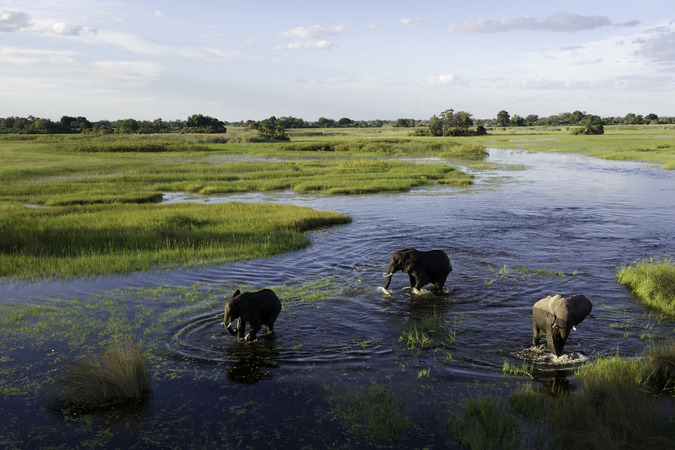
© Liquid Giraffe
A largely pristine wetland system that supports a diverse ecosystem during annual dry season flooding, the Okavango Delta is a world-famous safari destination and well-deserving of World Heritage status. Every year on 18 April, those cultural and natural sites deemed valuable assets by the UNESCO World Heritage Committee are celebrated.
Today, people around the world will be honouring those sites out of the 1,092 that are most significant to them.
We look at why the Okavango Delta was awarded the 1,000th position on the World Heritage List five years ago.
CONTRASTING LANDSCAPE
The annual flooding by the Okavango River into the Okavango Delta is a welcome respite during the height of Botswana’s dry season in June and July. It is one of a very few large inland delta systems without an outlet to the sea, its waters draining instead into the desert sands of the Central Kalahari Basin.
It is this astonishing juxtaposition of a lush wetland within an otherwise arid landscape that is the catalyst for spectacular wildlife gatherings. In a marvellous example of the interaction between climatic, hydrological and biological processes, the indigenous plants and animals have synchronised their biological cycles with these seasonal rains and floods.
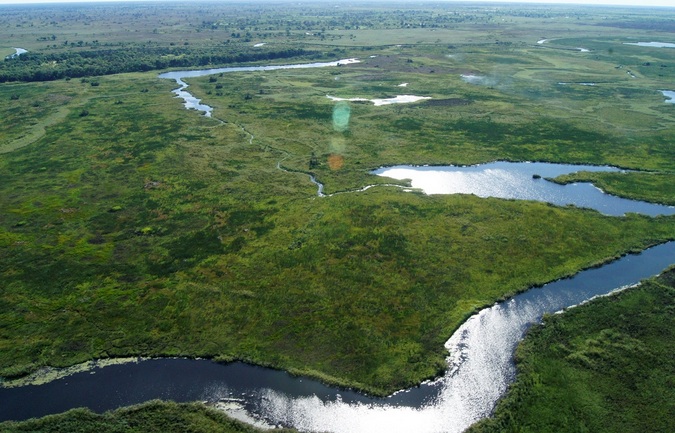
Aerial view over the Okavango Delta © Liquid Giraffe
ECOSYSTEM DIVERSITY
The Okavango Delta is home to healthy populations of some of the world’s most endangered large mammals, including cheetah, white rhino, painted wolves (African wild dog) and lion. Botswana supports the world’s largest population of elephants and the Okavango Delta is considered the core area for this species’ survival.
Along with these notable wildlife species, the delta supports 1,061 plant, 89 fish, 64 reptile, 482 bird and 130 mammal species. Each species has found its distinct habitats. Whether it be in the seasonal lagoons, permanent swamps, dry deciduous woodlands of any of the diverse habitats, each species lives within an ecosystem where it thrives.
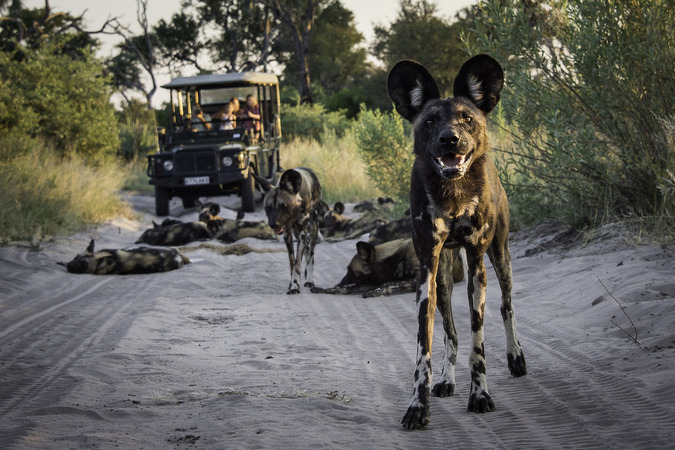
Pack of painted wolves (African wild dogs) © Dana Allen / Liquid Giraffe
TRULY WILD
As a remote and difficult area to access, the Okavango Delta has successfully sustained a high level of unspoiled wilderness across its vast 2 million hectares. There has been little significant development and impact by humans, with tourism to the inner delta actively limited by governmental policies to tented camps with access largely by air.
These safari properties are carefully managed and monitored for compliance with environmental standards and aim at the lowest ecological impact possible. Mining activity in the delta is prohibited and any such activity in neighbouring areas and countries are monitored closely to avoid any detrimental impacts to this environment.
From contrasting landscapes that are exceptionally wild and beautiful to diverse wildlife species that thrive in its various habitats, the Okavango Delta is well-deserving of its place on the World Heritage List.
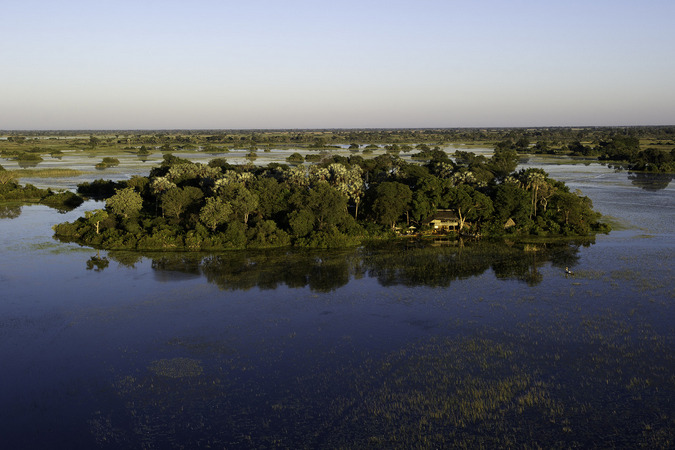
Jacana Camp by Wilderness Safaris © Dana Allen
Posted on 18 April, 2019 by Liquid Giraffe in Botswana, Destinations, Okavango Delta, Wildlife

© Liquid Giraffe
A largely pristine wetland system that supports a diverse ecosystem during annual dry season flooding, the Okavango Delta is a world-famous safari destination and well-deserving of World Heritage status. Every year on 18 April, those cultural and natural sites deemed valuable assets by the UNESCO World Heritage Committee are celebrated.
Today, people around the world will be honouring those sites out of the 1,092 that are most significant to them.
We look at why the Okavango Delta was awarded the 1,000th position on the World Heritage List five years ago.
CONTRASTING LANDSCAPE
The annual flooding by the Okavango River into the Okavango Delta is a welcome respite during the height of Botswana’s dry season in June and July. It is one of a very few large inland delta systems without an outlet to the sea, its waters draining instead into the desert sands of the Central Kalahari Basin.
It is this astonishing juxtaposition of a lush wetland within an otherwise arid landscape that is the catalyst for spectacular wildlife gatherings. In a marvellous example of the interaction between climatic, hydrological and biological processes, the indigenous plants and animals have synchronised their biological cycles with these seasonal rains and floods.

Aerial view over the Okavango Delta © Liquid Giraffe
ECOSYSTEM DIVERSITY
The Okavango Delta is home to healthy populations of some of the world’s most endangered large mammals, including cheetah, white rhino, painted wolves (African wild dog) and lion. Botswana supports the world’s largest population of elephants and the Okavango Delta is considered the core area for this species’ survival.
Along with these notable wildlife species, the delta supports 1,061 plant, 89 fish, 64 reptile, 482 bird and 130 mammal species. Each species has found its distinct habitats. Whether it be in the seasonal lagoons, permanent swamps, dry deciduous woodlands of any of the diverse habitats, each species lives within an ecosystem where it thrives.

Pack of painted wolves (African wild dogs) © Dana Allen / Liquid Giraffe
TRULY WILD
As a remote and difficult area to access, the Okavango Delta has successfully sustained a high level of unspoiled wilderness across its vast 2 million hectares. There has been little significant development and impact by humans, with tourism to the inner delta actively limited by governmental policies to tented camps with access largely by air.
These safari properties are carefully managed and monitored for compliance with environmental standards and aim at the lowest ecological impact possible. Mining activity in the delta is prohibited and any such activity in neighbouring areas and countries are monitored closely to avoid any detrimental impacts to this environment.
From contrasting landscapes that are exceptionally wild and beautiful to diverse wildlife species that thrive in its various habitats, the Okavango Delta is well-deserving of its place on the World Heritage List.

Jacana Camp by Wilderness Safaris © Dana Allen
"Education is the most powerful weapon which you can use to change the world." Nelson Mandela
The desire for equality must never exceed the demands of knowledge
The desire for equality must never exceed the demands of knowledge
- Lisbeth
- Site Admin
- Posts: 66700
- Joined: Sat May 19, 2012 12:31 pm
- Country: Switzerland
- Location: Lugano
- Contact:
Re: Okavango Delta becomes World Heritage site
Who is going to invite me for a couple of weeks in the Okavango? 
"Education is the most powerful weapon which you can use to change the world." Nelson Mandela
The desire for equality must never exceed the demands of knowledge
The desire for equality must never exceed the demands of knowledge
- Richprins
- Committee Member
- Posts: 75552
- Joined: Sat May 19, 2012 3:52 pm
- Location: NELSPRUIT
- Contact:
Re: Okavango Delta becomes World Heritage site
Please check Needs Attention pre-booking: https://africawild-forum.com/viewtopic.php?f=322&t=596
- Lisbeth
- Site Admin
- Posts: 66700
- Joined: Sat May 19, 2012 12:31 pm
- Country: Switzerland
- Location: Lugano
- Contact:
Re: Okavango Delta
Dereck & Beverly Joubert share deep life parallels in the making of Okavango, River of Dream series
Selene Brody | 02.08.2019
Sitting down for a one-on-one, video call with Dereck and Beverly Joubert, I’m not sure what to expect.
This iconic couple has for the better part of my travel journalism career been championing the cause of Africa’s wildlife and its wild spaces as National Geographic explorers in residence.
The last time I featured these stalwarts in showcasing Africa's wildlife on Traveller24, they were recovering from a serious run-in with a buffalo. TO THE VIDEO INTERVIEW CLICK ON THE TITLE.
At the time Beverly had about 21 bones smashed, with her face taking a full-impact blow - but the most severe part of it all was that the horn of the beast had come within a few inches of a major artery, after collapsing her lung and piercing her through her neck.
Dereck did not escape unharmed either.
He was the first one hit by the buffalo, which cracked his rib cage and broke his pelvis. Yet he somehow still mustered the ability to save Beverly who was impaled, as the buffalo ran off with her.
It resulted in an 8-month recovery period overall, just a year into the filming of the now completed Okavango: River of Dreams.
As their faces spring to life on my laptop screen, it’s remarkable how good they both look. A real testament to spending time in nature I suppose, but also a host of good doctors and surgeons I’m told.
In fact, as the conversation unfolds, it becomes clear that the accident that brought Beverly within inches of her life is something they’ve not only embraced but have fully incorporated into the creative process of the four-year-long filming project. The new series by National Geographic set to air on South African screens on National Geographic Wild in September is the reason for the interview.
This three-part series, set to air on 5, 6 & 7 September at 18:00 on National Geographic Wild, focuses on the Okavango in Southern Africa, its landscapes and wildlife. WATCH THE TRAILER BELOW
Dereck admits they could have easily put together a 52-part series while filming what he says was "a quest to reveal the real Okavango".
He then goes on to share how one of the core characters of the first episode, a lioness named Fekeetsa - meaning overcomes challenges, became a talisman for Beverly through the recovery process.
Turns out Fekeetsa also had a run in with a buffalo, creating “deep parallels with their relationship with the story”.
He says it’s incredible how she just "pushed through the pain... and she started to use her handicap and survived. Overcoming challenges just like Beverly did, making it especially close to our hearts".
Overall what they’ve since brought to life as a result is loosely based on Dante’s Divine Comedy – playing very heavily on the journey from one level in Paradise to Limbo and finally the Inferno - encapsulating the Divine Journey through the three parts of Botswana’s unique river – the only river in the world which ends inland, disappearing into a desert.
Dereck and Beverly describe it as a "multi-faceted tapestry, with so many aspects to appreciate". In fact they’re both of the opinion that the "biggest gift any visitor can give themselves is time. Time to explore".
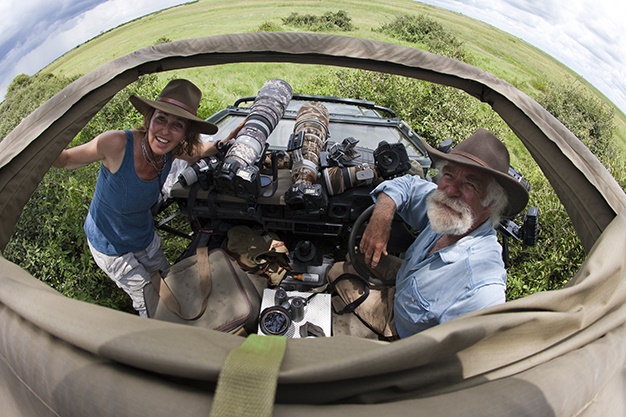
And they should know having spent more than +30 years exploring its wild parts.
So what can you expect from 'paradise'?
"It is always green and an entry into understanding the Okavango. It’s not where all the wildlife is ironically, because in the big deep reed beds there is no grazing," says Dereck.
"Further along in the floodplains you really get to see the big wildlife."
And then finally all the harshness is seen in the desert.
"On the fringes of the Salt Pans is sometimes where all the magic happens," says Beverly. "But one thing you cannot do is judge the Okavango."
They're all too aware that this river can be harsh, as can be some of the scenes. But they emphasise the need to "take time for discovery".
"If you really want to understand the Okavango you need to choose three big destinations within that story," suggests Dereck, "If you plan on visiting for 8 days take 12."
Beverly agrees saying, "Let the Okavango speak to you, and don't only see it from the road or the river. See it by air as well, it is a tapestry of nature and you need to appreciate every aspect."
As with the parallels they also encourage their audience to really connect with the Okavango. Beverly emphasises that within the influence of the series the river itself is one of the key characters of the journey as "water is key to life".
"Consider the symbolism of the human body with its various limbs, this river is really the heartbeat – without the river, there is nothing there."
"We dig quite deep into the personal journey – this is not just a look at the three or four faces of the Okavango. But also about being unafraid to look at the darker side of any journey that any of us would take and its profound meaning."
Having always championed the need for conservation and protection of Africa’s wildlife heritage the couple are deeply concerned with the recent changes in laws and policies around Botswana's wildlife - especially elephant and leopard hunting.
“There will always be a debate around what role nature plays in our lives. We’re going into a phase of use it and make it pay for itself. We are deeply concerned about that philosophy, especially when you consider that only 4% of the biomass across the earth is reserved for wildlife.
“We have to be very careful with how we use that last 4%,” says Dereck.
In light of the landmark UN report where more than 1-million species are already extinct, Beverly says "hunting really is not a form of conservation".
“There are many alternatives, in how to be successful and work closely with communities and for communities to benefit way more through eco-tourism than any other mechanism."
“Our ambition with this film is to present a picture of the real intrinsic value of a place like the Okavango. Not in how we can use it, but in the deep spiritual value of it - not just to us as filmmakers, but to the communities, people from around the world who derived their names from animal totems, from communities that gain revenue and support form eco-tourism.
"There are deep spiritual, rational and emotional reasons to preserve a place like the Okavango – and we wanted to celebrate that."
To find out more about how you can get involved with supporting the Joubert's conservation efforts visit the Great Plains Conservation Rhinos without Borders and don't miss Okavango: River of Dreams on National Geographic Wild from 5, 6, & 7 September at 18:00 (3 part series).
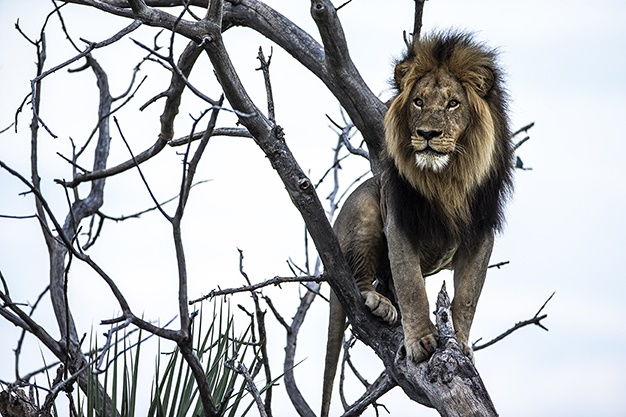
(Photos: Beverly Joubert, National Geographic Explorer)
Selene Brody | 02.08.2019
Sitting down for a one-on-one, video call with Dereck and Beverly Joubert, I’m not sure what to expect.
This iconic couple has for the better part of my travel journalism career been championing the cause of Africa’s wildlife and its wild spaces as National Geographic explorers in residence.
The last time I featured these stalwarts in showcasing Africa's wildlife on Traveller24, they were recovering from a serious run-in with a buffalo. TO THE VIDEO INTERVIEW CLICK ON THE TITLE.
At the time Beverly had about 21 bones smashed, with her face taking a full-impact blow - but the most severe part of it all was that the horn of the beast had come within a few inches of a major artery, after collapsing her lung and piercing her through her neck.
Dereck did not escape unharmed either.
He was the first one hit by the buffalo, which cracked his rib cage and broke his pelvis. Yet he somehow still mustered the ability to save Beverly who was impaled, as the buffalo ran off with her.
It resulted in an 8-month recovery period overall, just a year into the filming of the now completed Okavango: River of Dreams.
As their faces spring to life on my laptop screen, it’s remarkable how good they both look. A real testament to spending time in nature I suppose, but also a host of good doctors and surgeons I’m told.
In fact, as the conversation unfolds, it becomes clear that the accident that brought Beverly within inches of her life is something they’ve not only embraced but have fully incorporated into the creative process of the four-year-long filming project. The new series by National Geographic set to air on South African screens on National Geographic Wild in September is the reason for the interview.
This three-part series, set to air on 5, 6 & 7 September at 18:00 on National Geographic Wild, focuses on the Okavango in Southern Africa, its landscapes and wildlife. WATCH THE TRAILER BELOW
Dereck admits they could have easily put together a 52-part series while filming what he says was "a quest to reveal the real Okavango".
He then goes on to share how one of the core characters of the first episode, a lioness named Fekeetsa - meaning overcomes challenges, became a talisman for Beverly through the recovery process.
Turns out Fekeetsa also had a run in with a buffalo, creating “deep parallels with their relationship with the story”.
He says it’s incredible how she just "pushed through the pain... and she started to use her handicap and survived. Overcoming challenges just like Beverly did, making it especially close to our hearts".
Overall what they’ve since brought to life as a result is loosely based on Dante’s Divine Comedy – playing very heavily on the journey from one level in Paradise to Limbo and finally the Inferno - encapsulating the Divine Journey through the three parts of Botswana’s unique river – the only river in the world which ends inland, disappearing into a desert.
Dereck and Beverly describe it as a "multi-faceted tapestry, with so many aspects to appreciate". In fact they’re both of the opinion that the "biggest gift any visitor can give themselves is time. Time to explore".

And they should know having spent more than +30 years exploring its wild parts.
So what can you expect from 'paradise'?
"It is always green and an entry into understanding the Okavango. It’s not where all the wildlife is ironically, because in the big deep reed beds there is no grazing," says Dereck.
"Further along in the floodplains you really get to see the big wildlife."
And then finally all the harshness is seen in the desert.
"On the fringes of the Salt Pans is sometimes where all the magic happens," says Beverly. "But one thing you cannot do is judge the Okavango."
They're all too aware that this river can be harsh, as can be some of the scenes. But they emphasise the need to "take time for discovery".
"If you really want to understand the Okavango you need to choose three big destinations within that story," suggests Dereck, "If you plan on visiting for 8 days take 12."
Beverly agrees saying, "Let the Okavango speak to you, and don't only see it from the road or the river. See it by air as well, it is a tapestry of nature and you need to appreciate every aspect."
As with the parallels they also encourage their audience to really connect with the Okavango. Beverly emphasises that within the influence of the series the river itself is one of the key characters of the journey as "water is key to life".
"Consider the symbolism of the human body with its various limbs, this river is really the heartbeat – without the river, there is nothing there."
"We dig quite deep into the personal journey – this is not just a look at the three or four faces of the Okavango. But also about being unafraid to look at the darker side of any journey that any of us would take and its profound meaning."
Having always championed the need for conservation and protection of Africa’s wildlife heritage the couple are deeply concerned with the recent changes in laws and policies around Botswana's wildlife - especially elephant and leopard hunting.
“There will always be a debate around what role nature plays in our lives. We’re going into a phase of use it and make it pay for itself. We are deeply concerned about that philosophy, especially when you consider that only 4% of the biomass across the earth is reserved for wildlife.
“We have to be very careful with how we use that last 4%,” says Dereck.
In light of the landmark UN report where more than 1-million species are already extinct, Beverly says "hunting really is not a form of conservation".
“There are many alternatives, in how to be successful and work closely with communities and for communities to benefit way more through eco-tourism than any other mechanism."
“Our ambition with this film is to present a picture of the real intrinsic value of a place like the Okavango. Not in how we can use it, but in the deep spiritual value of it - not just to us as filmmakers, but to the communities, people from around the world who derived their names from animal totems, from communities that gain revenue and support form eco-tourism.
"There are deep spiritual, rational and emotional reasons to preserve a place like the Okavango – and we wanted to celebrate that."
To find out more about how you can get involved with supporting the Joubert's conservation efforts visit the Great Plains Conservation Rhinos without Borders and don't miss Okavango: River of Dreams on National Geographic Wild from 5, 6, & 7 September at 18:00 (3 part series).

(Photos: Beverly Joubert, National Geographic Explorer)
"Education is the most powerful weapon which you can use to change the world." Nelson Mandela
The desire for equality must never exceed the demands of knowledge
The desire for equality must never exceed the demands of knowledge
- Lisbeth
- Site Admin
- Posts: 66700
- Joined: Sat May 19, 2012 12:31 pm
- Country: Switzerland
- Location: Lugano
- Contact:
Re: Okavango Delta
SA filmmakers take on the mighty Okavango River in new series
2019-08-31 09:07
Aletta Harrison
https://youtu.be/yjXpoudDKZ4
WATCH | SA filmmakers take on the mighty Okavango River in new series
The story of Dereck and Beverly Joubert's romance is intimately intertwined with their 40-year love affair with Botswana. With the release of their brand new series about the Okavango their story comes full circle. Watch.
The story of Dereck and Beverly Joubert's romance is intimately intertwined with their 40-year love affair with Botswana.
The South African filmmakers have been captivating audiences with their wildlife films for decades, and have been passionate conservationists for many years too.
But with the release of their brand new four-part series about the Okavango, their story comes full circle.
Speaking to News24 ahead of the release, the Jouberts reflect on a deeply personal four-year journey to complete their latest piece of work, fraught with personal and professional challenges that included Beverly's brush with death after a buffalo attacked the couple in 2017.
Okavango: River of Dreams premieres in Ireland and the UK on September 1 and will be screened in Africa and Europe on September 5.
Watch the full trailer here:https://www.africawild-forum.com/viewto ... 24#p464124
2019-08-31 09:07
Aletta Harrison
https://youtu.be/yjXpoudDKZ4
WATCH | SA filmmakers take on the mighty Okavango River in new series
The story of Dereck and Beverly Joubert's romance is intimately intertwined with their 40-year love affair with Botswana. With the release of their brand new series about the Okavango their story comes full circle. Watch.
The story of Dereck and Beverly Joubert's romance is intimately intertwined with their 40-year love affair with Botswana.
The South African filmmakers have been captivating audiences with their wildlife films for decades, and have been passionate conservationists for many years too.
But with the release of their brand new four-part series about the Okavango, their story comes full circle.
Speaking to News24 ahead of the release, the Jouberts reflect on a deeply personal four-year journey to complete their latest piece of work, fraught with personal and professional challenges that included Beverly's brush with death after a buffalo attacked the couple in 2017.
Okavango: River of Dreams premieres in Ireland and the UK on September 1 and will be screened in Africa and Europe on September 5.
Watch the full trailer here:https://www.africawild-forum.com/viewto ... 24#p464124
"Education is the most powerful weapon which you can use to change the world." Nelson Mandela
The desire for equality must never exceed the demands of knowledge
The desire for equality must never exceed the demands of knowledge
- Lisbeth
- Site Admin
- Posts: 66700
- Joined: Sat May 19, 2012 12:31 pm
- Country: Switzerland
- Location: Lugano
- Contact:
Re: Okavango Delta
Botswana’s Okavango Delta is created by a delicate balance, but for how much longer?
14.11.2019 3.31pm | Michael Murray-Hudson, Senior Research Fellow, Okavango Research Institute, University of Botswana. Olivier Dauteuil,
Directeur de Recherche au CNRS, Université Rennes
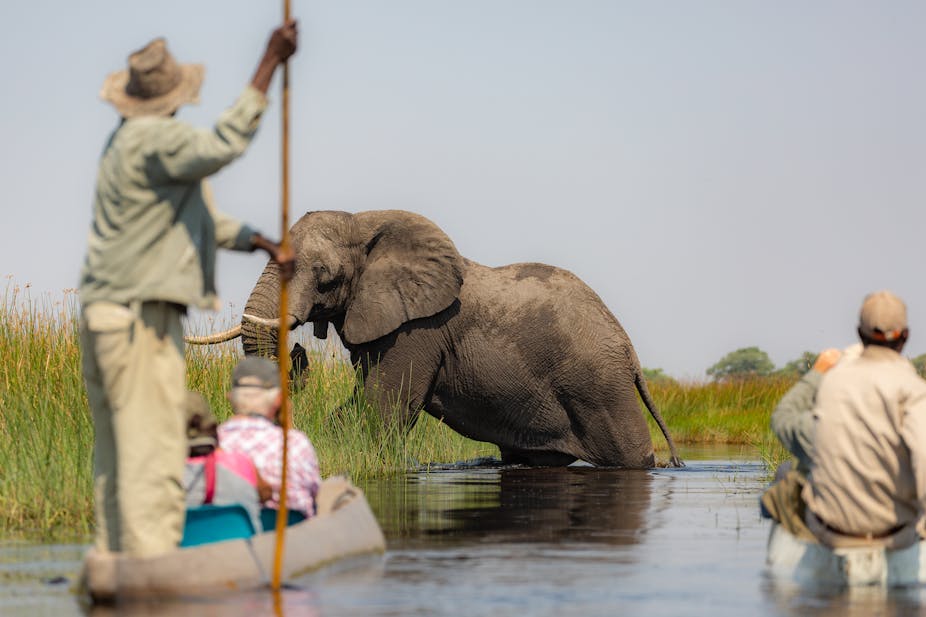
The Delta’s rich array of wildlife makes it a popular tourist destination. Ger Metselaar/Shutterstock
The Okavango Delta in northern Botswana is a mosaic of water paths, floodplains and arid islands. The delta sits in the Okavango river basin, which spans three African countries: Angola, Namibia and Botswana.
Because it’s an oasis, in a semi-arid area, it hosts a rich array of plants and attracts a huge variety of wildlife.
As a unique ecosystem, in 2014 it was placed on UNESCO’s World Heritage list and it is an iconic tourist destination, which generates 13% of Botswana’s GDP.
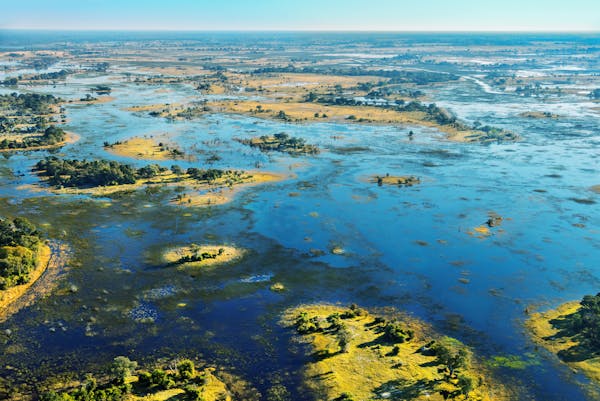
Aerial view of the Okavango Delta. Vadim Petrakov/Shutterstock
But it’s a fragile natural area. It’s controlled by deformations of the Earth’s crust over a long time (thousands to millions of years) and by annual water flows and evaporation. The size of the flooded delta from year to year varies between 3,500km² and 9,000km² because of weather fluctuations which control its water supply.
Any change to the processes that form the delta will have an impact on the wildlife and local economic activities. Its grassy floodplains are food for grazing animals in the dry period. Losses of this habitat will cause declines in wildlife and livestock. It’s therefore imperative to understand what creates and sustains the delta for the future management of the system.
We have conducted several studies that cover how the Okavango basin was formed and the way dissolved chemicals are withdrawn from the delta’s surface.
The dynamic history of the Okavango Delta’s waterways and floodplains tells us that the interplay between geology, water and plants makes the delta resilient, but vulnerable.
Some imminent changes are expected that are of concern. One is higher temperatures, which will boost evaporation and transpiration. Another is the pumping of water for irrigation in Namibia. Both of these changes will reduce the water needed to sustain the delta’s floodplains.
An oasis
The Okavango Delta is a generally flat area which is under constant change with phases of flooding and drying. A variety of geographical and natural processes have formed it and sustain it.
It’s in a depression which was created by fault lines cutting the Earth’s surface. This means water flows into it. The fault lines are created by the spread of the East African Rift – a major fracture, created over millions of years, which crosses the eastern part of Africa.
The origin of the islands in the delta is attributed to two mechanisms: the construction of termite mound spires; and formation of elevated ridges where former channels deposited sand. Both act as the starting point for vegetation to take root.
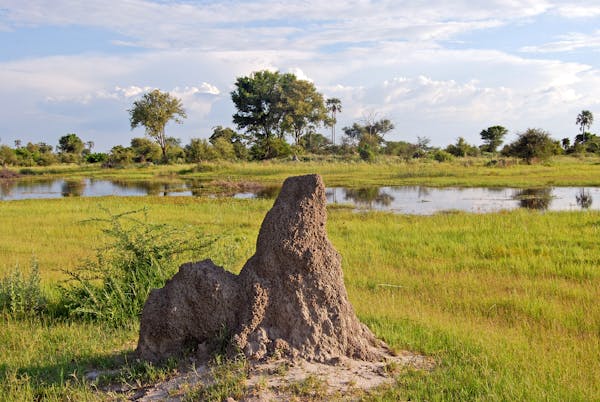
Termite mound in the delta. PIXEL to the PEOPLE/Shutterstock
The water supply comes from the Cubango and Cuito rivers in Angola. This reaches the delta between March and June and peaks in July. There’s also local rainfall in the Okavango area from November to February (about 450mm a year) which adds to this.
About 98% of the water that goes into the delta is eventually lost through evaporation and plant transpiration, when water moves through the plant and evaporates from leaves, stems and flowers.
Even though the subtropical sun generates intense evaporation, the delta’s water is fresh, not salty. This is surprising because water samples from the middle parts of the islands have very high chemical and salt concentrations. This chemical concentration occurs in thousands of islands.
The reason the water is fresh is that trees on the edges of the islands have created a barrier of natural filters between the inner part of the islands and the floodplain.
Possible changes
The Okavango Delta is continually being shaped by complex interactions of natural processes. If something happens to change the balance of these processes, it could destabilise the system.
The most important dynamic for the delta is inflowing water. The two main rivers in Angola, the Cubango and the Cuito, join to form the Okavango river, which feeds the delta. These two rivers are hydrologically quite different. The Cubango, to the west, first flows rapidly down steep, narrow paths characterised by incised valleys, rapids, waterfalls and valley swamps. The Cuito, to the east, with shallow valleys and large floodplains, gets its water from groundwater seepage.
The manipulation of these rivers – in the form of dams and irrigation – will affect the water flow and change its annual distribution. Both of these form part of current and future development planning in Angola and Namibia.
A decrease in water supply will affect the vegetation growth and the wildlife. An increase in water would inundate the islands and could dissolve the salts at the centre of them, releasing chemical elements that would change the water quality.
In addition to declines in water flow induced by global warming and human activities, ground deformation is also happening because of shifting continental plates. This could change the paths of the water flowing by changing the ground slopes. Measurements of ground deformation with Global Positioning Systems displays reveal very slight changes in local slopes that can modify the paths of the water flowing to the delta.
To sustain the Okavango Delta it’s imperative that management integrate all the components of the system. All governments are involved and must integrate scientific expertise, from upstream catchment to downstream Delta.
14.11.2019 3.31pm | Michael Murray-Hudson, Senior Research Fellow, Okavango Research Institute, University of Botswana. Olivier Dauteuil,
Directeur de Recherche au CNRS, Université Rennes

The Delta’s rich array of wildlife makes it a popular tourist destination. Ger Metselaar/Shutterstock
The Okavango Delta in northern Botswana is a mosaic of water paths, floodplains and arid islands. The delta sits in the Okavango river basin, which spans three African countries: Angola, Namibia and Botswana.
Because it’s an oasis, in a semi-arid area, it hosts a rich array of plants and attracts a huge variety of wildlife.
As a unique ecosystem, in 2014 it was placed on UNESCO’s World Heritage list and it is an iconic tourist destination, which generates 13% of Botswana’s GDP.

Aerial view of the Okavango Delta. Vadim Petrakov/Shutterstock
But it’s a fragile natural area. It’s controlled by deformations of the Earth’s crust over a long time (thousands to millions of years) and by annual water flows and evaporation. The size of the flooded delta from year to year varies between 3,500km² and 9,000km² because of weather fluctuations which control its water supply.
Any change to the processes that form the delta will have an impact on the wildlife and local economic activities. Its grassy floodplains are food for grazing animals in the dry period. Losses of this habitat will cause declines in wildlife and livestock. It’s therefore imperative to understand what creates and sustains the delta for the future management of the system.
We have conducted several studies that cover how the Okavango basin was formed and the way dissolved chemicals are withdrawn from the delta’s surface.
The dynamic history of the Okavango Delta’s waterways and floodplains tells us that the interplay between geology, water and plants makes the delta resilient, but vulnerable.
Some imminent changes are expected that are of concern. One is higher temperatures, which will boost evaporation and transpiration. Another is the pumping of water for irrigation in Namibia. Both of these changes will reduce the water needed to sustain the delta’s floodplains.
An oasis
The Okavango Delta is a generally flat area which is under constant change with phases of flooding and drying. A variety of geographical and natural processes have formed it and sustain it.
It’s in a depression which was created by fault lines cutting the Earth’s surface. This means water flows into it. The fault lines are created by the spread of the East African Rift – a major fracture, created over millions of years, which crosses the eastern part of Africa.
The origin of the islands in the delta is attributed to two mechanisms: the construction of termite mound spires; and formation of elevated ridges where former channels deposited sand. Both act as the starting point for vegetation to take root.

Termite mound in the delta. PIXEL to the PEOPLE/Shutterstock
The water supply comes from the Cubango and Cuito rivers in Angola. This reaches the delta between March and June and peaks in July. There’s also local rainfall in the Okavango area from November to February (about 450mm a year) which adds to this.
About 98% of the water that goes into the delta is eventually lost through evaporation and plant transpiration, when water moves through the plant and evaporates from leaves, stems and flowers.
Even though the subtropical sun generates intense evaporation, the delta’s water is fresh, not salty. This is surprising because water samples from the middle parts of the islands have very high chemical and salt concentrations. This chemical concentration occurs in thousands of islands.
The reason the water is fresh is that trees on the edges of the islands have created a barrier of natural filters between the inner part of the islands and the floodplain.
Possible changes
The Okavango Delta is continually being shaped by complex interactions of natural processes. If something happens to change the balance of these processes, it could destabilise the system.
The most important dynamic for the delta is inflowing water. The two main rivers in Angola, the Cubango and the Cuito, join to form the Okavango river, which feeds the delta. These two rivers are hydrologically quite different. The Cubango, to the west, first flows rapidly down steep, narrow paths characterised by incised valleys, rapids, waterfalls and valley swamps. The Cuito, to the east, with shallow valleys and large floodplains, gets its water from groundwater seepage.
The manipulation of these rivers – in the form of dams and irrigation – will affect the water flow and change its annual distribution. Both of these form part of current and future development planning in Angola and Namibia.
A decrease in water supply will affect the vegetation growth and the wildlife. An increase in water would inundate the islands and could dissolve the salts at the centre of them, releasing chemical elements that would change the water quality.
In addition to declines in water flow induced by global warming and human activities, ground deformation is also happening because of shifting continental plates. This could change the paths of the water flowing by changing the ground slopes. Measurements of ground deformation with Global Positioning Systems displays reveal very slight changes in local slopes that can modify the paths of the water flowing to the delta.
To sustain the Okavango Delta it’s imperative that management integrate all the components of the system. All governments are involved and must integrate scientific expertise, from upstream catchment to downstream Delta.
"Education is the most powerful weapon which you can use to change the world." Nelson Mandela
The desire for equality must never exceed the demands of knowledge
The desire for equality must never exceed the demands of knowledge


